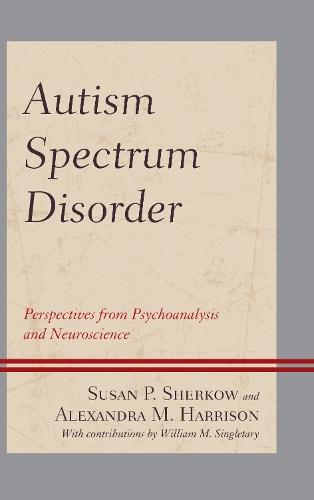Full Product Details
Author: Susan P. Sherkow ,
William M. Singletary, M.D. ,
Alexandra M. Harrison
Publisher: Jason Aronson Publishers
Imprint: Jason Aronson Publishers
Dimensions:
Width: 15.70cm
, Height: 2.30cm
, Length: 23.60cm
Weight: 0.481kg
ISBN: 9780765708625
ISBN 10: 0765708620
Pages: 232
Publication Date: 14 November 2013
Audience:
Professional and scholarly
,
Professional & Vocational
Format: Hardback
Publisher's Status: Active
Availability: In Print

This item will be ordered in for you from one of our suppliers. Upon receipt, we will promptly dispatch it out to you. For in store availability, please contact us.
Reviews
This book, with its central focus on the parent-child relationship, offers a unique and very important contribution. Parents struggle terribly in their efforts to make sense of the behavior of a child with a wide range of neuro-developmental challenges that currently fall under the heading of Autism Spectrum Disorders. Drawing on extensive evidence from the fields of genetics and neuroscience as well as in-depth clinical material, the authors show how a clinician can set these children on healthy developmental paths by supporting parents' efforts to find meaning in their children's behavior. -- Claudia M. Gold, MD, Newton-Wellesley Hospital, author of Keeping Your Child in Mind
This book, with its central focus on the parent-child relationship, offers a unique and very important contribution. Parents struggle terribly in their efforts to make sense of the behavior of a child with a wide range of neuro-developmental challenges that currently fall under the heading of Autism Spectrum Disorders. Drawing on extensive evidence from the fields of genetics and neuroscience as well as in-depth clinical material, the authors show how a clinician can set these children on healthy developmental paths by supporting parents’ efforts to find meaning in their children’s behavior. -- Claudia M. Gold, MD, Newton-Wellesley Hospital, author of ""Keeping Your Child in Mind"" This is a cutting-edge book about autism spectrum disorder. It has concise summaries of numerous etiologic and associated factors known concerning ASD. The clinical vignettes include heartening and compelling examples of new and old therapies and how treated children can ‘lose’ their ASD diagnoses. -- Gilbert Kliman, MD, The Children's Psychological Trauma Center
This book, with its central focus on the parent-child relationship, offers a unique and very important contribution. Parents struggle terribly in their efforts to make sense of the behavior of a child with a wide range of neuro-developmental challenges that currently fall under the heading of Autism Spectrum Disorders. Drawing on extensive evidence from the fields of genetics and neuroscience as well as in-depth clinical material, the authors show how a clinician can set these children on healthy developmental paths by supporting parents' efforts to find meaning in their children's behavior. -- Claudia M. Gold, MD, Newton-Wellesley Hospital, author of Keeping Your Child in Mind This is a cutting-edge book about autism spectrum disorder. It has concise summaries of numerous etiologic and associated factors known concerning ASD. The clinical vignettes include heartening and compelling examples of new and old therapies and how treated children can 'lose' their ASD diagnoses. -- Gilbert Kliman, MD, The Children's Psychological Trauma Center
"This book, with its central focus on the parent-child relationship, offers a unique and very important contribution. Parents struggle terribly in their efforts to make sense of the behavior of a child with a wide range of neuro-developmental challenges that currently fall under the heading of Autism Spectrum Disorders. Drawing on extensive evidence from the fields of genetics and neuroscience as well as in-depth clinical material, the authors show how a clinician can set these children on healthy developmental paths by supporting parents’ efforts to find meaning in their children’s behavior. -- Claudia M. Gold, MD, Newton-Wellesley Hospital, author of ""Keeping Your Child in Mind"" This is a cutting-edge book about autism spectrum disorder. It has concise summaries of numerous etiologic and associated factors known concerning ASD. The clinical vignettes include heartening and compelling examples of new and old therapies and how treated children can ‘lose’ their ASD diagnoses. -- Gilbert Kliman, MD, The Children's Psychological Trauma Center"
Author Information
Susan P. Sherkow, MD, is a training and supervising analyst at the Berkshire Psychoanalytic Institute and Society as well as a child supervising analyst at the New York Psychoanalytic Institute. She has forty years of experience working with autistic children and is founder of the Sherkow Center. Alexandra M. Harrison, MD, is a training and supervising analyst at the Boston Psychoanalytic Society and Institute. She is the author of the blog supportingchildcaregivers.com. William M. Singletary,MD, is a child and adult psychiatrist and psychoanalyst on the faculty of the Psychoanalytic Center of Philadelphia with approximately twenty-five years of experience treating autism spectrum disorder.




